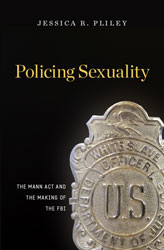New from Harvard University Press:
Policing Sexuality: The Mann Act and the Making of the FBI (Nov. 2014), by
Jessica R. Pliley (Texas State University). A description from the Press:
America’s first anti–sex trafficking
law, the 1910 Mann Act, made it illegal to transport women over state
lines for prostitution “or any other immoral purpose.” It was meant to
protect women and girls from being seduced or sold into sexual slavery.
But, as Jessica Pliley illustrates, its enforcement resulted more
often in the policing of women’s sexual behavior, reflecting
conservative attitudes toward women’s roles at home and their movements
in public. By citing its mandate to halt illicit sexuality, the
fledgling Bureau of Investigation gained entry not only into brothels
but also into private bedrooms and justified its own expansion.
Policing Sexuality links the crusade against sex trafficking
to the rapid growth of the Bureau from a few dozen agents at the time of
the Mann Act into a formidable law enforcement organization that
cooperated with state and municipal authorities across the nation. In
pursuit of offenders, the Bureau often intervened in domestic squabbles
on behalf of men intent on monitoring their wives and daughters. Working
prostitutes were imprisoned at dramatically increased rates, while
their male clients were seldom prosecuted.
In upholding the Mann Act, the FBI reinforced sexually conservative
views of the chaste woman and the respectable husband and father. It
built its national power and prestige by expanding its legal authority
to police Americans’ sexuality and by marginalizing the very women it
was charged to protect.
A few blurbs:
“A fascinating, first-rate study. Using a remarkable trove of documents in the Bureau of Investigation’s white slavery files, Pliley
resurrects a lost history of conflicts over gender, sexuality,
masculinity, disease, and deviance in the early twentieth-century United
States.”—Beverly Gage
“A brilliant, counterintuitive history of
the FBI that takes women from the margins—party girls and runaways,
adventurers and adulterers, hardened hustlers and delinquent
daughters—and shows how they were central to the rise of federal power
in America. Written in crystal clear, jargon-free prose, and brimming
with important insights, Policing Sexuality is a major
contribution to the histories of sexuality and government surveillance,
and will be required reading for anyone interested in the sex trade,
past, present, or future.”—Debby Applegate
More information is available
here.
